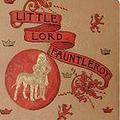Chapter 6 (8)
Fauntleroy drew a long breath. "I WANT to see it," he said. "I want to see it so much I can hardly wait. But I'm afraid there isn't time." "You MUST go and see your mother this afternoon?" asked the Earl. "You think you can't put it off?" "Why," said Fauntleroy, "she has been thinking about me all the morning, and I have been thinking about her!" "Oh!" said the Earl.
"You have, have you? Ring the bell." As they drove down the avenue, under the arching trees, he was rather silent. But Fauntleroy was not. He talked about the pony. What color was it? How big was it? What was its name? What did it like to eat best? How old was it? How early in the morning might he get up and see it?
"Dearest will be so glad!" he kept saying. "She will be so much obliged to you for being so kind to me! She knows I always liked ponies so much, but we never thought I should have one. There was a little boy on Fifth Avenue who had one, and he used to ride out every morning and we used to take a walk past his house to see him." He leaned back against the cushions and regarded the Earl with rapt interest for a few minutes and in entire silence.
"I think you must be the best person in the world," he burst forth at last. "You are always doing good, aren't you?—and thinking about other people. Dearest says that is the best kind of goodness; not to think about yourself, but to think about other people. That is just the way you are, isn't it?" His lordship was so dumfounded to find himself presented in such agreeable colors, that he did not know exactly what to say. He felt that he needed time for reflection. To see each of his ugly, selfish motives changed into a good and generous one by the simplicity of a child was a singular experience.
Fauntleroy went on, still regarding him with admiring eyes—those great, clear, innocent eyes!
"You make so many people happy," he said. "There's Michael and Bridget and their ten children, and the apple-woman, and Dick, and Mr. Hobbs, and Mr. Higgins and Mrs. Higgins and their children, and Mr. Mordaunt,—because of course he was glad,—and Dearest and me, about the pony and all the other things. Do you know, I've counted it up on my fingers and in my mind, and it's twenty-seven people you've been kind to. That's a good many—twenty-seven!" "And I was the person who was kind to them—was I?" said the Earl.
"Why, yes, you know," answered Fauntleroy. "You made them all happy. Do you know," with some delicate hesitation, "that people are sometimes mistaken about earls when they don't know them. Mr. Hobbs was. I am going to write him, and tell him about it." "What was Mr. Hobbs's opinion of earls?" asked his lordship.
"Well, you see, the difficulty was," replied his young companion, "that he didn't know any, and he'd only read about them in books. He thought—you mustn't mind it—that they were gory tyrants; and he said he wouldn't have them hanging around his store. But if he'd known YOU, I'm sure he would have felt quite different. I shall tell him about you." "What shall you tell him?" "I shall tell him," said Fauntleroy, glowing with enthusiasm, "that you are the kindest man I ever heard of. And you are always thinking of other people, and making them happy and—and I hope when I grow up, I shall be just like you." "Just like me!" repeated his lordship, looking at the little kindling face. And a dull red crept up under his withered skin, and he suddenly turned his eyes away and looked out of the carriage window at the great beech-trees, with the sun shining on their glossy, red-brown leaves.
"JUST like you," said Fauntleroy, adding modestly, "if I can. Perhaps I'm not good enough, but I'm going to try."

